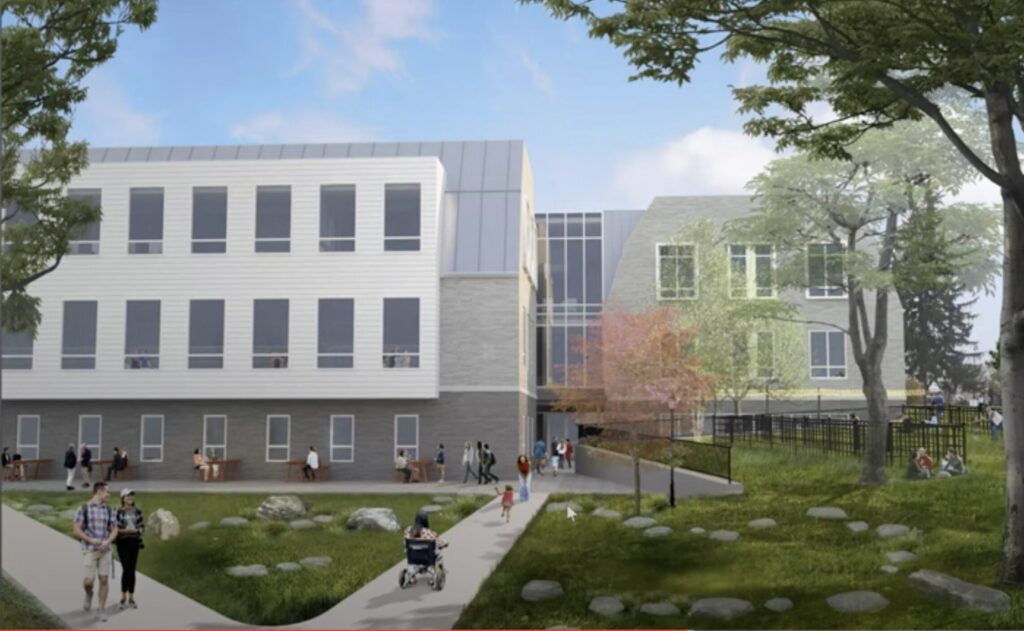Opinion: Town Council Grants Blank Check to Jones Library Expansion Project

Architect's rendering showing modified Jones Library design with exterior value engineering changes (as of 7/22/24) , including removed pedestrian bridges from rear rain garden. Photo: amherstma.gov

If the Jones Library Expansion project is going to happen, the new addition will be constructed, metaphorically, on the ruins of the rest of the town. Or perhaps literally, if that tiny construction easement results in considerable damage to the adjacent Strong House. It won’t be long before the sponsors are back in front of the town council with a request to borrow a lot more money. And the council will cave, as they did on Monday night (4/14), perhaps not because they still believe that it will be money well spent, but because once there is a gaping hole in the library, they will have no choice but to follow through and complete the project.
For Those Just Tuning In
When three town councilors called a special meeting to rescind the borrowing for the Jones Library Expansion project last week, it seemed to me that with so many aspects of the project fraying at the edges, with so many critical questions unanswered, with a bid that was six months old, and with economic chaos resulting from Trump’s tariffs intensifying by the day, that even if the council didn’t outright back out of the project (something they came within one vote of doing in June of 2024), they might at least demand that the project be put back out to bid again to get a much clearer picture of what this undertaking would really cost the town. With construction costs escalating across the nation, I reasoned that when our town councilors saw the new numbers, that they would likely say — enough! — we’re not going to borrow another $2 million or $10 million for this project, especially in this unstable economic environment.
I thought that before the town manager signed a construction contract, committing the town to complete the project at an as-yet-uncertain final cost, everyone would want to know what the project would actually cost and how we would pay for it. Turns out I was wrong. Nine councilors demonstrated on April 14 that they really don’t care how much the project will cost — and they also do not seem to be worried about how the town will pay for it.
Magical Thinking : “The Money Will Be There When We Need It”
The town is obligated to borrow the full cost of the project up front and $46 million in borrowing is currently authorized. The Jones Trustees still need to raise $8 million to meet their share of their agreement with the town and more if costs exceed the $46 million estimate, with most experts in the construction industry saying that substantial increases in construction costs are likely.
Bockelman informed the Town Council on April 14, that since the Jones trustees have promised to deliver the money, it will be there when we need it. In support of their promise, the trustees are putting up their endowment as collateral, even though that endowment is needed for the annual operating budget of the library. This struck many as risky fiscal policy, even if we don’t take into consideration (1) the dismal performance of the Jones Capital Campaign to date; (2) that all of this is happening in the midst of escalating fiscal and constitutional crises; or (3) that the value of the Jones endowment is diminishing by the day in the face of eye-popping market declines. While the trustees assured us that donations would pour in once construction got underway, even the town’s attorney confirmed that the town would be “on the hook” for all of the costs of the project, including whatever the trustees fail to deliver.
At no time through any of this has Bockelman been willing to undertake an analysis of the impact that absorbing additional debt will have on the town’s operating and capital budgets and ability to meet other pressing needs for the next 20 years or 30 years that we are paying off the debt on this project.
Town Councilors Toe the Line
Town Councilors Cathy Schoen and Bob Hegner, who along with Councilor Jennifer Taub initially proposed the motion to rescind the borrowing authorization, purportedly because of concerns over accelerating costs and the weak fundraising by the Capital Campaign, flipped their votes to oppose rescission. At the April 14 meeting that they helped to make happen, Schoen and Hegner said that they could now support moving forward with the demolition and expansion because of the new information that Bockelman shared just prior to the meeting.
But Bockelman provided no new information to the council. He simply shared what he has been sharing for the last few weeks while repeating his mantra that the project cannot cost more than $46 million because that is all the money that we will have. He expressed his confidence that any cost increases should be fully covered by a $3 million contingency built into that estimate. Bockelman declined to respond to concerns of how the contingency might be impacted by new tariffs, supply chain disruptions, and inflation. He did clarify that if expenses exceed $46 million, the town would not be able to continue with the project unless the town council approves further borrowing. And he emphasized that the council will always have a choice of whether they want to continue, if costs exceed expectations.
But how much choice will the Town Council have once there is a gaping hole in the historic building?
It seems likely that the project will quickly eat up the $3 million contingency covering tariff-related costs alone, and exceed the outdated and unrealistic estimate. So the sponsors will likely be back in front of the council with a request for more borrowing. How much? We don’t know because the town council and the trustees chose not to do the expected due diligence (calculating the impacts of tariffs, supply chain disruptions, and inflation) that would give us at least a good guess.
Once the wrecking ball takes its first swing at the 1993 addition to the Jones, it will be impossible to just stop. From that instant on, the town will be locked in to completing the library expansion regardless of the cost. What the town council has effectively done, without making any effort to come up with a realistic estimate of the final cost, or to seriously evaluate the risks, is to give a blank check to the Jones Library Trustees.
I note, with frustration, that some of those councilors who spoke most passionately in defense of funding this project are the same people who spoke forcefully against appropriating more money for our schools, which would have saved having to fire valuable educators and staff.
A Shameful Legacy
The disaster that I anticipate from all of this magical thinking will be decades of harsh austerity for our town. Our massive and oversized library addition will stand as an edifice to poor planning while the rest of the town crumbles around it. The people who tied the hands of future town councils will be long gone when the town is still struggling to pay off this debt. So it is important that we remember who is responsible for putting the town in this predicament. The primary culprits, the people who had a chance to stop this profligate and risky commitment of town funds, the people who might have demanded the data and analyses that would have produced a more prudent and less risky final plan, the people who approved a blank check, are the nine town councilors who voted against rescission: Cathy Schoen and Freke Ette (District 1), Lynne Griesemer and Pat DeAngelis (District 2), George Ryan (District 3), Ana Devlin-Gauthier and Bob Hegner (District 5), Mandi Jo Hanneke and Andy Steinberg (at large), and Town Manager Paul Bockelman.
They broke it. They own it. The problem is, we’re going to pay for it.
Art Keene is a 42 year resident of Amherst’s District 3, Professor of Anthropology Emeritus at UMass Amherst, and Managing Editor of the Amherst Indy.

“ The people who tied the hands of future town councils will be long gone when the town is still struggling to pay off this debt. So it is important that we remember who is responsible for putting the town in this predicament.”
The upside and downside of this truth…we, and some of them, will likely no longer be here to reap what they sowed.